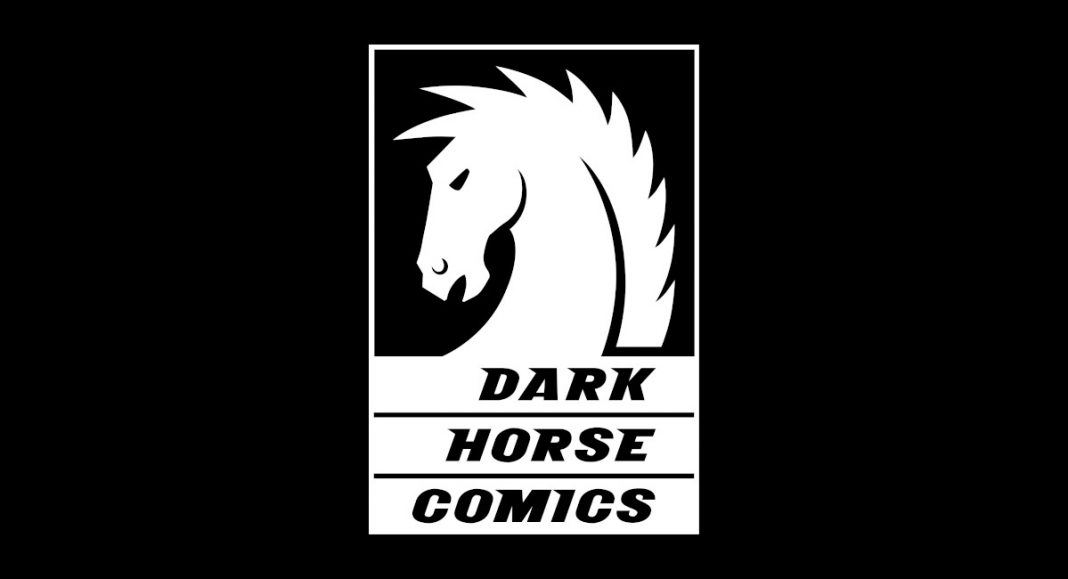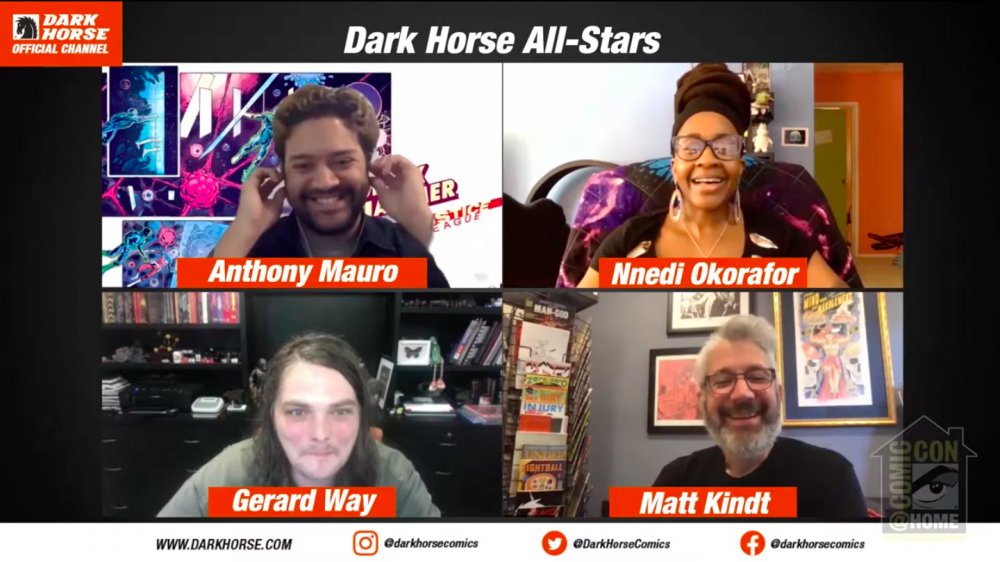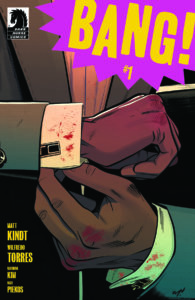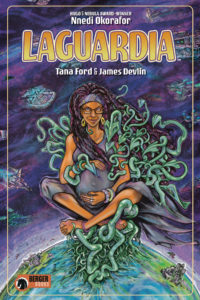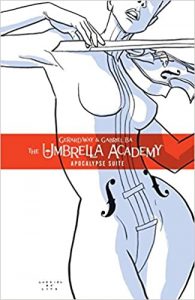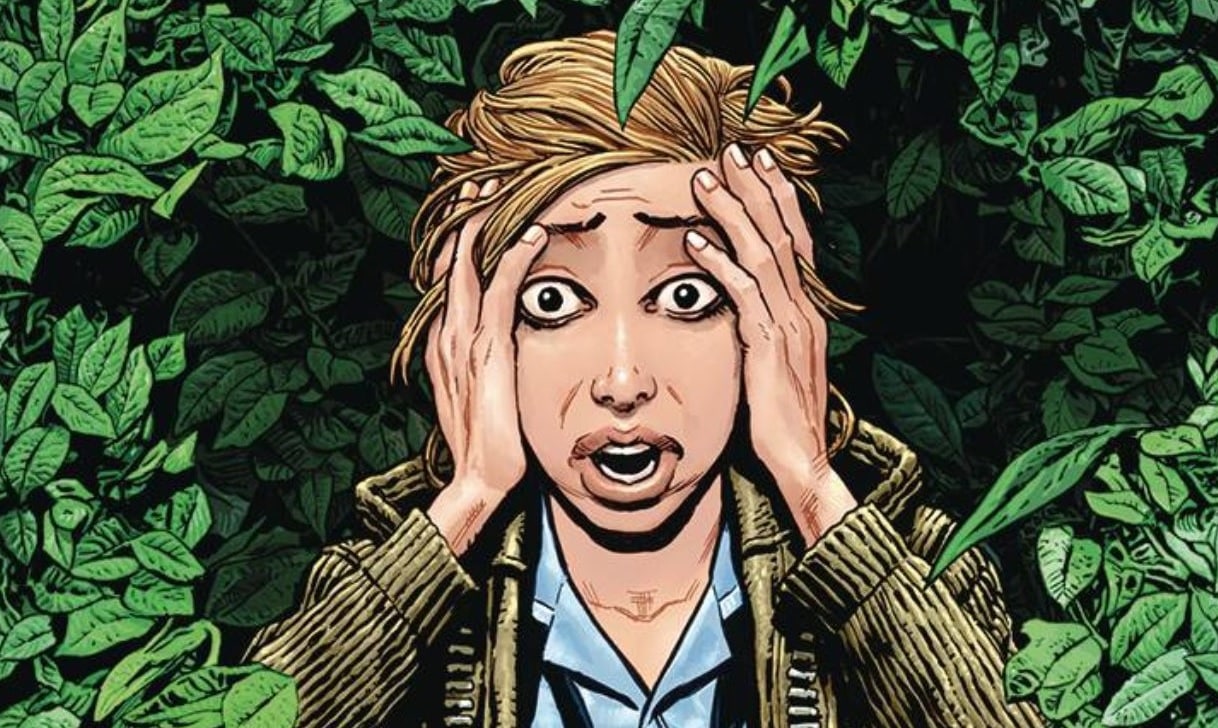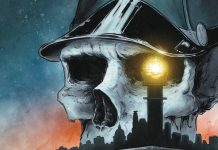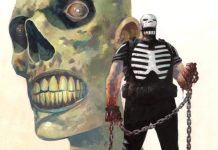Dark Horse Comics’s first panel of this year’s SDCC@Home was made available to view today. The Dark Horse All-Stars panel was moderated by Dark Horse PR coordinate Anthony Mauro, and featured appearances by a trio of writers: Eisner Award winner Laguardia’s Nnedi Okorafor, Mind MGMT, Ether, & Bang!’s Matt Kindt, and The Umbrella Academy’s Gerard Way.
Mauro kicked off the panel by asking how each of the writers came to comics. For Okorafor, she said she discovered comics through the newspaper as a child, and that the format attracted her eye, citing Garfield as her ‘in’ to comics. She said she didn’t feel welcome in comic shops, which kept her from getting into the comic books for years, but that newspaper comics and the combination of words with pictures are what kept her interested.
Way told a story about getting his tonsils taken out in the 3rd grade, and his grandmother giving him a Super-Pickle stuffed animal and a three-pack of comics while he was in the hospital. He said that was when he got into them, starting to go to the corner store to get X-Men comics. Kindt said his earliest comics were Tintin, which he and his brother would get from the university bookstore while his mom was in school. He described he and his brother as “loser kids” who would return their Coke bottles to get money that they would use to buy comics at the grocery store.
Mauro asked each writer where the ideas for their Dark Horse stories came from. Okorafor told a story about an experience she had going through airport security at Laguardia, in particular the scrutiny with which they looked through her hair. Afterward she realized she had a can of mace in her bag that security hadn’t seen because they were so intent on looking through her hair. The event stuck with her and became the story in which a woman smuggles an alien plant through airport security.
With The Umbrella Academy, Way said he’d been making comics for a long time as a kid, and that he majored in cartooning at the School of Visual Arts in college. After interning at DC, Way tried to break into mainstream comics, before ending up designing toys in New Jersey. After My Chemical Romance took off, Way said he still missed what he’d been doing before, and that reading reprints of Grant Morrison and Richard Case’s Doom Patrol reignited his passion for making comics. Umbrella Academy came about because Way wanted to “throw people right into the story,” and that he developed the characters, and the story which sprang out of them, while he was on the road before pitching the series to Dark Horse.
Kindt talked about Bang!’s inception as coming out of a conversation he had with editor Daniel Chabon. Kindt was encouraged to do something featuring multiple characters as part of a larger universe, but was hesitant to do anything with superheroes. Thinking about what was missing in comics, Kindt said as a kid he read crime novels and pulps, and the characters who had similar DNA to superheroes that he could work with, before realizing that no one reading comics today actually cares about characters like Doc Savage or The Shadow. He then started thinking about ‘80s TV shows like Knight Rider and The A-Team, and how they carried forward the archetypes from the older material he read. He said he decided to bring those forward to today and use those archetypes within something he would want to read now as an adult.
Mauro mentioned that everyone talked about developing their characters first, and asked why they think that’s important. Way responded that, as he mentioned earlier, the story and the world always grows out of the characters, which Okorafor agreed with. “You can have a plot, but that plot will depend on the character,” she said. Different characters might do different things when faced with the same situations.
Mauro praised the intimacy of the stories the creators tell, and how they balance those with the fantastical elements of the worlds of each series. Kindt said the fantastical parts are the “candy coating” that he puts on the stories to draw people in to read what the story is “really about.” He also said he needs genre elements to be involved in order to get excited enough to check something out before the character can hook him. Okorafor talked about seeing how characters react to everything that’s around them, and that world-building for her comes through the eyes of her characters. “The worlds that I write about are huge, but it’s all about the character experiencing that world.”
Kindt was asked how he makes sure to make all of his many characters over the various different series he writes unique. He said the most fun part, as well as the most challenging part, of writing is pretending to be someone else. Similarly, Way said he had to find a way in with the Umbrella Academy, but likened the personalities at play in the group to being in a band. He said he also was able to draw from personal experiences for each of the characters, with each of them representing an aspect of him, but that it’s more fun to write the characters who don’t draw from him personally.
Okorafor said she hears her characters talk to her strongly, and that the character Future in Laguardia does things that she herself doesn’t do. She talked about writing novels without an outline, and how characters have altered the course of what she expected was going to happen in her novels. She described her characters as “alive” and uncontrollable, and said she just has to “let it ride” when things go differently as a result of the characters. Mauro asked Kindt and Way if they experience the same thing Okorafor describes, and Way said it does, and that he tries to leave room in his outlines for character discoveries. Kindt agreed, particularly in regards to creator-owned work, and the leeway to let characters go in different directions makes them more interesting to write and read than corporately-owned IP.
Since all three creators have written in different formats, whether it’s novels, songs, comics, screenplays, etc., Mauro asked how the creative process for comics compares to writing for other mediums. Okorafor described novel-writing as a solitary experience, whereas comics is very collaborative with the rest of the creative team. She said she always keeps the artist’s work in mind when she’s writing a comic script, to make sure she’s writing to their strength. She also reiterated that she writes novels without an outline or length requirement, whereas with comics she outlines everything and has a strict length in mind when writing.
Way said he wants to eventually write a novel, considering it a challenge for himself, and that he likes to take on jobs that require all of his skills. “My scripts are really dense, and there’s a lot of art direction in them, and I’m very descriptive,” he said. He praised Gabriel Ba’s ability to improve upon the sketches and layouts that he sends, and agreed with Okorafor that he likes to know who’s drawing a story before he writes the script.
Kindt said, of prose, comics, and screenplays, he thinks comics are “the trickiest one” due to the space limitations of both the page and the issue length. He said he appreciates the other formats more after writing comics, as in a novel he can be really descriptive and in a screenplay he can write long stretches of dialogue. He also said working in those mediums has made him appreciate the things that comics can do that other formats can’t, particularly in terms of reader engagement.
Mauro asked why each writer chose comics for their stories vs. another format. For Way, he said the draw was that “comics are so limitless,” with no limited budgets. He also said the freedom to do whatever he wants in a creator-owned comic is appealing, in comparison to making a corporate comic or a TV show where there are people to answer to for things. Okorafor agreed, saying that Laguardia was “always a comic” from the development of its first scene. She said she wanted to see the colors of the story on the page, and reiterated what Way said about comics being a limitless medium. Laguardia is populated by numerous extra-terrestrials, which Okorafor said would’ve been more difficult to get across in another medium, but that works perfectly in comics. Kindt recalled having turned in an outline for a project for another comics publisher, and getting a note back from the editor saying it wouldn’t work for television, a response that baffled him.
In closing, the writers offered things they’ve been enjoying during the past few months of social distancing and quarantine. Okorafor mentioned the TV Series Mr. Robot, as well as the novels Life of Pi by Yann Martel and [jokingly] The Art of War by Sun Tzu. Way said he’s been reading old roleplaying game books, and that he likes to read because it allows him to shut his brain off. He said he’s been “in research mode” and reading older golden age and silver age comics as well. Kindt said he spends every morning reading, and recommended The Three-Body Problem by Liu Cixin. In the afternoon he said he watches movies, and in the evenings he’s been watching Community with his daughter.
With that, Mauro thanked the panelists for joining, and the first Dark Horse video panel ended.
Miss any of our other SDCC 2020 coverage? Click here for much more!


